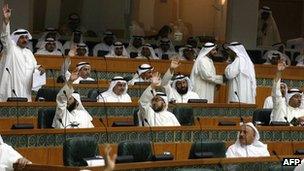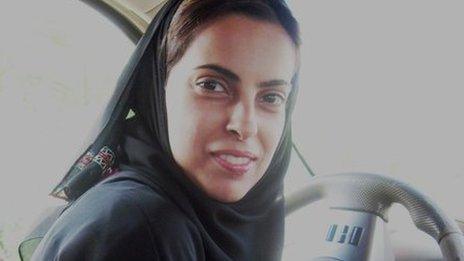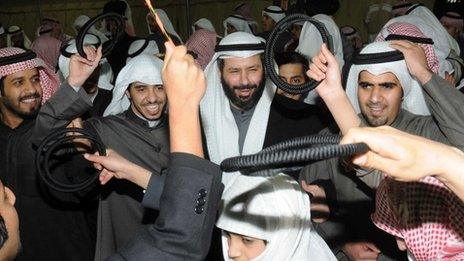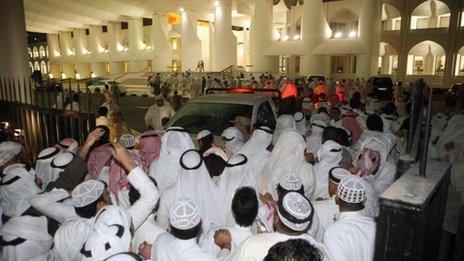Kuwaiti pleads not guilty at Twitter blasphemy trial
- Published

A law endorsed by Kuwaiti MPs stipulates capital punishment for any Muslim guilty of blasphemy
A Kuwaiti man has pleaded not guilty to charges that he insulted the Prophet Muhammad and the rulers of Saudi Arabia and Bahrain in messages on Twitter.
Hamad al-Naqi, a Shia Muslim, said his Twitter account had been hacked and that he had not written the messages.
The judge denied Mr Naqi's request for bail after two months in detention and adjourned his trial until next week.
Mr Naqi faces up to 10 years in prison if convicted, but Sunni activists have said he should be sentenced to death.
"He will be an example for anyone who thinks he can do such a thing," Duwaim al-Muwazri, a civil plaintiff who is arguing the case against Mr Naqi, told the Reuters news agency.
'Opinion crime'
An amended law endorsed by the Kuwaiti parliament this month stipulates capital punishment for any Muslim who, through any form of expression, insults God, his prophets, messengers, the Prophet Muhammad's wives or the Koran, unless the defendant publicly repents.
If the defendant repents, a sentence of at least five years' imprisonment will be imposed. Repeat offenders will receive the death sentence.
Mr Naqi's lawyer, Khaled al-Shatti, said the death penalty could not be applied in this case because the alleged crime had taken place before the change in legislation.
The amendment has also not yet been signed by the Emir of Kuwait, Sheikh Sabah al-Ahmed Al Sabah, he added. If the emir does not approve it, the bill will be returned to parliament where it will become law if two-thirds of MPs vote for it again.
Mr Shatti also criticised the decision not to release his client on bail.
"Even if we were to imagine hypothetically that he did say something, this would be an 'opinion crime', not a crime threatening state security," he said.
Last week, an appeals court reportedly upheld a 10-year prison sentence for a Twitter user found guilty of insulting the emir and calling for the overthrow of the government.
About a third of Kuwait's 1.1 million citizens are Shia and the emirate's Sunni-led government is concerned they may launch protests demanding more democracy and an end to discrimination like those in majority-Shia Bahrain and in Saudi Arabia's predominantly Shia Eastern Province.
- Published27 March 2012

- Published3 February 2012

- Published16 November 2011

- Published26 October 2022